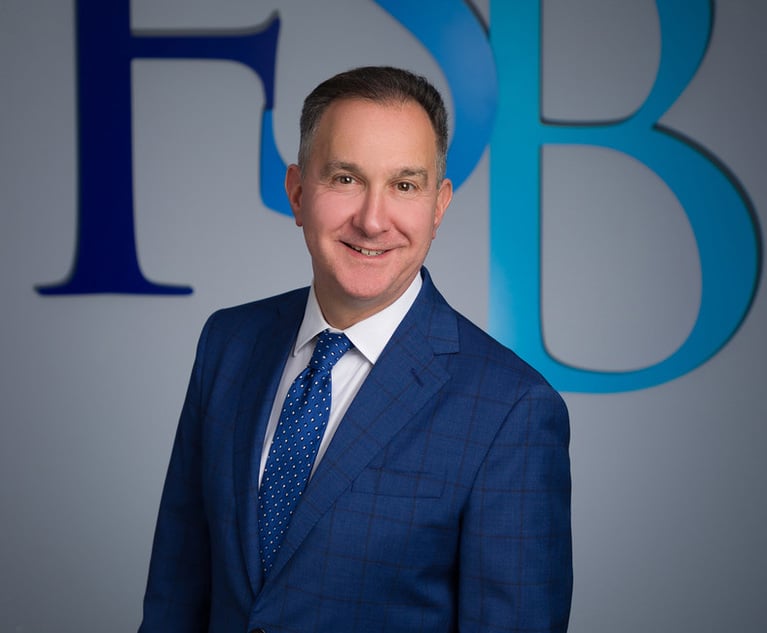 New Jersey Appellate Division Judge Jose Fuentes/photo by Carmen Natale
New Jersey Appellate Division Judge Jose Fuentes/photo by Carmen NataleLawyers Wary of Ruling Allowing Polluters to Be Hauled Into Municipal Court
The ruling has sparked criticism that hearing environmental matters in a court known for handling traffic cases is a bad policy.
November 15, 2019 at 11:39 AM
5 minute read
A recent appeals court decision allowing for environmental cases to be heard in a venue known for handling drunken driving cases has put lawyers on edge.
A state appeals court ruled Wednesday that municipal courts have jurisdiction to impose civil penalties in enforcement actions brought by the Department of Environmental Protection under the Spill Act. The ruling is expected to put to rest arguments that municipal courts lack authority to hear such cases.
But the ruling won't stop criticism that hearing environmental matters in municipal court is a bad policy.
The ruling comes as state regulators are bringing more actions against polluters in municipal court, which is an attractive venue for the DEP because it can get cases there far sooner than it can in Superior Court or the Office of Administrative Law. But environmental lawyers warn municipal judges tend to be unfamiliar with environmental cases or the scientific evidence used to show a violation occurred.
"This is all because of speed. [DEP lawyers] have many violations to file and they're conscious the superior courts are overburdened," said environmental lawyer Mitchell Kizner of Flaster/Greenberg. "They'll keep on doing it unless they find out it doesn't go well for them. It all depends on what their experience is."
Matthew Karmel, an environmental lawyer at Riker Danzig Scherer Hyland & Perretti in Morristown, regularly appears in municipal court on behalf of Spill Act defendants.
Karmel said the state brings Spill Act cases in municipal court in hopes of encouraging defendants to agree to a settlement in which they remediate pollution on their properties, even though municipal court proceedings only focus on fines.
An appearance, even in municipal court, may encourage a defendant to consider a settlement more seriously than a strongly worded letter or phone call from the DEP. But even then, municipal courts still have limitations.
"Even the simplest of environmental cases is complicated," Karmel said. "The complex ones are tremendously complicated. I don't think it makes sense to have a municipal court involved in complicated matters."
Karmel wrote in a 2017 blog post for his firm that the DEP has been experimenting with taking certain environmental violations to municipal court, most commonly the failure to retain a licensed site remediation professional. From start to finish, the process takes three to six months in municipal court, but might require several years to complete through an administrative proceeding, he wrote.
The DEP brought 53 cases to municipal court in 2018, according to the agency website.
Wednesday's appeals court ruling affirmed a Middlesex County judge who found the Milltown Municipal Court was an appropriate venue for an enforcement action by the DEP against Alsol Corp.
The panel ruled that municipal courts can hear actions under the Spill Act to impose civil penalties in proceedings conducted pursuant to the Penalty Enforcement Law of 1999.
The case stemmed from the discharge in October 2016 of an unknown amount of oil laden with polychlorinated biphenyl into Farrington Lake from a property in Milltown that was owned by Alsol. The oil came from electrical transformers on the property, which Alsol had contracted to demolish. A contractor hired by Alsol hired a subcontractor to clean up the oil, but that company quit the job partway through because the contractor never paid for its services. The DEP stepped in to perform emergency response work to contain and partially remediate the spill.
The DEP later filed a complaint against Alsol in Milltown Municipal Court using the "Special Form of Complaint and Summons" prescribed by the administrative director of the courts.
At the municipal court, Alsol moved to dismiss the case for lack of subject-matter jurisdiction, arguing that municipal courts do not have the authority to adjudicate the merits of a Spill Act enforcement action. The municipal judge granted Alsol's motion to dismiss, concluding the Spill Act does not confer municipal courts with jurisdiction to enforce civil penalties where a finding of liability has already been adjudicated.
The DEP appealed to Middlesex County Superior Court, which found the municipal court did have jurisdiction to impose penalties in the case. Alsol appealed.
At the Appellate Division, Judges Jose Fuentes, Allison Accurso and Francis Vernoia concluded that the language of the Spill Act gave the DEP the choice of enforcing the act's monetary penalties in Superior Court or in the municipal court that has territorial jurisdiction.
Fuentes, writing for the court, said the trial judge's interpretation of the law was not entitled to any deference because the jurisdiction of municipal courts over a Spill Act enforcement is purely a question of law. He noted that the Legislature has set the jurisdiction of municipal courts to include proceedings to collect a penalty where jurisdiction is granted by statute, as in the present case, in addition to violations of traffic laws, petty disorderly persons offenses and violation of fish and game laws, among other things.
Fuentes added that the Supreme Court has also exercised its constitutional authority over this issue when it adopted Rule 7-2-1(h), which authorizes the summons the DEP used in this case. And he added that a similar statutory scheme was addressed by the Appellate Division in 1991 when it ruled in Middlesex County v. Browning Ferris Industries that the Solid Waste Management Act permits civil actions to impose fines for violations in a municipal court in addition to the Superior Court.
This content has been archived. It is available through our partners, LexisNexis® and Bloomberg Law.
To view this content, please continue to their sites.
Not a Lexis Subscriber?
Subscribe Now
Not a Bloomberg Law Subscriber?
Subscribe Now
NOT FOR REPRINT
© 2024 ALM Global, LLC, All Rights Reserved. Request academic re-use from www.copyright.com. All other uses, submit a request to [email protected]. For more information visit Asset & Logo Licensing.
You Might Like
View All


Hit by Mail Truck: Man Agrees to $1.85M Settlement for Spinal Injuries
Law Firms Mentioned
Trending Stories
Who Got The Work
Michael G. Bongiorno, Andrew Scott Dulberg and Elizabeth E. Driscoll from Wilmer Cutler Pickering Hale and Dorr have stepped in to represent Symbotic Inc., an A.I.-enabled technology platform that focuses on increasing supply chain efficiency, and other defendants in a pending shareholder derivative lawsuit. The case, filed Oct. 2 in Massachusetts District Court by the Brown Law Firm on behalf of Stephen Austen, accuses certain officers and directors of misleading investors in regard to Symbotic's potential for margin growth by failing to disclose that the company was not equipped to timely deploy its systems or manage expenses through project delays. The case, assigned to U.S. District Judge Nathaniel M. Gorton, is 1:24-cv-12522, Austen v. Cohen et al.
Who Got The Work
Edmund Polubinski and Marie Killmond of Davis Polk & Wardwell have entered appearances for data platform software development company MongoDB and other defendants in a pending shareholder derivative lawsuit. The action, filed Oct. 7 in New York Southern District Court by the Brown Law Firm, accuses the company's directors and/or officers of falsely expressing confidence in the company’s restructuring of its sales incentive plan and downplaying the severity of decreases in its upfront commitments. The case is 1:24-cv-07594, Roy v. Ittycheria et al.
Who Got The Work
Amy O. Bruchs and Kurt F. Ellison of Michael Best & Friedrich have entered appearances for Epic Systems Corp. in a pending employment discrimination lawsuit. The suit was filed Sept. 7 in Wisconsin Western District Court by Levine Eisberner LLC and Siri & Glimstad on behalf of a project manager who claims that he was wrongfully terminated after applying for a religious exemption to the defendant's COVID-19 vaccine mandate. The case, assigned to U.S. Magistrate Judge Anita Marie Boor, is 3:24-cv-00630, Secker, Nathan v. Epic Systems Corporation.
Who Got The Work
David X. Sullivan, Thomas J. Finn and Gregory A. Hall from McCarter & English have entered appearances for Sunrun Installation Services in a pending civil rights lawsuit. The complaint was filed Sept. 4 in Connecticut District Court by attorney Robert M. Berke on behalf of former employee George Edward Steins, who was arrested and charged with employing an unregistered home improvement salesperson. The complaint alleges that had Sunrun informed the Connecticut Department of Consumer Protection that the plaintiff's employment had ended in 2017 and that he no longer held Sunrun's home improvement contractor license, he would not have been hit with charges, which were dismissed in May 2024. The case, assigned to U.S. District Judge Jeffrey A. Meyer, is 3:24-cv-01423, Steins v. Sunrun, Inc. et al.
Who Got The Work
Greenberg Traurig shareholder Joshua L. Raskin has entered an appearance for boohoo.com UK Ltd. in a pending patent infringement lawsuit. The suit, filed Sept. 3 in Texas Eastern District Court by Rozier Hardt McDonough on behalf of Alto Dynamics, asserts five patents related to an online shopping platform. The case, assigned to U.S. District Judge Rodney Gilstrap, is 2:24-cv-00719, Alto Dynamics, LLC v. boohoo.com UK Limited.
Featured Firms
Law Offices of Gary Martin Hays & Associates, P.C.
(470) 294-1674
Law Offices of Mark E. Salomone
(857) 444-6468
Smith & Hassler
(713) 739-1250







